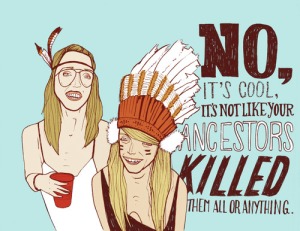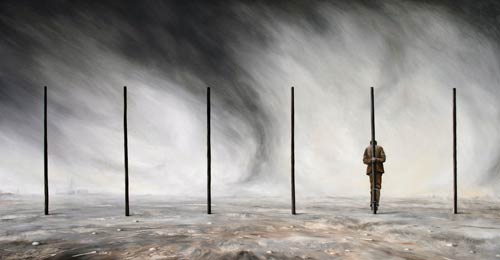Wednesday, April 30, 2014
Radical Wellington: talk at the Wellington Public Library
My talk on Radical Wellington at the Wellington Public Library, Wednesday 21 August 2013. In it I cover the colourful radicals of the early labour movement in Wellington – anarchists and the Industrial Workers of the World. As well as organising one of New Zealand’s first anarchist collectives, Philip Josephs and members of the IWW were active in Wellington's working-class counter culture and the Great Strike of 1913. This talk highlights the role of literature, meetings and international events in these events.
Sunday, April 27, 2014
Un-Settling Settler Desires

By Scott Morgensen, Unsettling Ourselves
My presentation to the Dakota Decolonization class echoed my broader teaching and writing by centering the principles of Indigenous feminist thought and its ties to women of color and Third World feminism. Andrea Smith in her book Conquest: Sexual Violence and American Indian Genocide (2005) writes that colonization and heteropatriarchy inherently interlink, so that opposition to one requires opposition to the other. Her Indigenous feminist argument links to the principle of intersectionality in women of color and Third World feminisms, which appears in the Combahee River Collective’s “A Black Feminist Statement” (1977) in the claim that “all the major systems of oppression are interlocking.”
I learned to commit to these principles by investigating and challenging the power and privilege that structure my life as a white, educationally-privileged, US American male, non-transgender and (temporarily) able-bodied. My lifelong experience as a queer person who has suffered from heteropatriarchy did teach me about oppression and resistance, as did my family’s struggles with work and income. But given my social locations, those experiences were not sufficient to teach me that colonization is the condition of heteropatriarchy and capitalism in the U.S., or that all the major systems of oppression intersect. Learning this required being challenged by Indigenous and women of color and Third World feminists to study how colonization, whiteness and racism, capitalism, ableism, and heteropatriarchy interlink in the world and in my life. Such an understanding contextualizes all my words about settlers and settlement.
My writing critically investigates the desires of settlers to feel connected to Indigenous land and culture. In her contribution to this sourcebook, Waziyatawin discusses Albert Memmi’s distinction of the colonizer and the colonized. I intend my use of the term “settler” to be compatible with Memmi’s term “colonizer” and with its discussion by Waziyatawin. “Settler” is a way to describe colonizers that highlights their desires to be emplaced on Indigenous land. The settler desires I study are not tied to any particular politics. Among settlers, “conservatives,” “liberals,” and “radicals” (to name only a few) share similar desires that simply express in varied ways. For instance, settler radicals, including anarchists, have proven capable of forming movements that profess to be anticolonial even as they claim Indigenous land and culture as their own. I recognize among settler radicals a difference between those who pursue a politics that tries to sustain their ties to Indigenous land and culture, and those who question any desire to possess them. I promote the latter in this essay as a way to radicalize settlers to challenge settler colonialism and support Indigenous decolonization.
I argue that critical reflection on settler desires for Indigenous land and culture will be crucial to any effort by settlers to ally with Indigenous decolonization struggles. I invite settlers to ask: How do their desires for Indigenous land and culture express colonization and contradict efforts to support Indigenous decolonization? How can settlers question their desires for Indigenous land and culture as a basis of committing to decolonization? Settlers can study every attachment they have felt to Indigenous land and ask how those relate to colonization. Historically, a desire to live on Indigenous land and to feel connected to it–bodily, emotionally, spiritually–has been the normative formation of settlers. Settler radicals who commit to Indigenous decolonization must act differently. Is it possible, at once, for settlers to wish to live on or feel linked to Indigenous land, and to act in support of decolonization? Should settler radicals first commit to be willing to no longer live on Indigenous land or have any connection to it, as part of fully committing to work for decolonization? Note that my questions do not dictate answers to how settlers’ lives will appear after pursuing such work. I merely insist that asking such questions define how settlers begin such work, so that they inform what comes after. How can settler radicals commit to be ready to no longer live on Indigenous land, or to have any connection to it as part of joining work for decolonization? How would settler radicalism appear differently if this question were central to it?
If settler radicals challenge their desires to live on Indigenous land, they also will challenge their desires to study, practice, or feel in any way linked to Indigenous culture. I am thinking here of Andrea Smith’s critique in Conquest of spiritual appropriation as a form of colonial and sexual violence. I also think of Waziyatawin’s statement to the Dakota Decolonization class of the relationship between Indigenous land and spirituality, which makes decolonization of land necessary to the practice of Indigenous spirituality. With these claims in mind, settler radicals must ask how their feelings of attachment to Indigenous land and culture enact appropriation and violence. Settlers are supposed to be people who connect to Indigenous land–the land where they were raised, or that they inherit after settling it–by studying Indigenous history and culture and linking it to their lives. Historically, non-Natives became settlers by adapting Indigenous dwelling sites, travel routes, place names, modes of gathering or cultivating food, and spiritual knowledges and practices.1 These acts are part of the normative function of conquest and settlement. Thus, decolonization does not follow if settlers simply study and emulate the lives of Indigenous people on Indigenous land.
Settler radicals desperately need to investigate this truth. It is relevant in particular to those for whom anarchism links them to communalism and counterculturism, such as in rural communes, permaculture, squatting, hoboing, foraging, and neo-pagan, earth-based, and New Age spirituality. These “alternative” settler cultures formed by occupying and traversing stolen Indigenous land and often by practicing cultural and spiritual appropriation. Their participants have imagined that they act anti-colonially by “appreciating” Indigenous culture or pursuing what they imagine to be Indigenous ways of life. But using these methods to try to be intimate with Indigenous land and culture expresses settler desires without necessarily contradicting them. Critiquing and separating from these practices may be necessary for settlers to commit to work for Indigenous decolonization.
This is a hard lesson for settler radicals to learn if they felt led to support Indigenous people by participating in “alternative” settler cultures. They must ask, then, if their interest to support Indigenous people arose not from an investment in decolonization, but in recolonization. Did they emulate, or impersonate Indigenous culture in order to gain the trust or affection of Indigenous people; in hopes, then, that they would gain access to the Indigenous culture or land that they, as settlers, actually desire? It’s twisted, but true: settler radicals may seek “solidarity” with Indigenous people by pursuing settler desires to possess Indigenous land and culture for themselves. If this is so, their supposedly “alternative” cultures present no alternative to the settler cultures that Indigenous decolonization will disrupt. All must be questioned if settlers are to commit to the work of Indigenous decolonization.
I write these brief thoughts in order to introduce and invite broader conversations whose complexity my words here have not begun to fulfill. My statements and questions mean not to limit conversation but to open it. I have asked settler radicals to continually pursue critical reflection that will un-settle their senses of self and relationship to place. I am playing here on multiple meanings in the word “unsettle,” notably its correlation with the word “displace.” Certainly, in this context, “unsettling” suggests the work of displacing settlers from their possession of Indigenous land. The word reminds settler radicals to divest of their desires to occupy Indigenous land in order to work for decolonization. But “unsettling” also can invoke the qualities that settlers try to avoid feeling, such as uncertainty, discomfort, and–in an emotive sense–displacement. Colonization is an ongoing process making settlers desire the certainty and comfort of emplacement. Such feelings are incompatible with the commitment to work for Indigenous decolonization. Embracing uncertainty and discomfort–getting used to these feelings, and learning to live well amidst them–will be the productive and enlivening result of settlers displacing their centrality on stolen land and committing to work for Indigenous decolonization.
~
1 Among the wide array of writing on these histories by scholars in Native Studies, my words here refer in particular to Vince Deloria, Custer Died for Your Sins: An Indian Manifesto (1969) and to Philip Deloria, Playing Indian (1998).
Tuesday, April 22, 2014
Field Punishment No.1 - a film on objectors to the First World War
'Field Punishment No.1', the story of the 14 objectors shipped to Europe and tortured during WW1 is screening tonight: http://tvnz.co.nz/field-punishment-no1/index-group-5869688.
You can also watch it online at the link above.
Friday, April 18, 2014
Why the term ‘settler’ needs to stick
By Corey Snelgrove and Klara Woldenga, The Martlet
This semester, I’ve heard at least one person express their love for this land and their discomfort with the term “settler.” This individual did not see how the term applied to their situation and found it divisive and hurtful. They chalked up conflicts within indigenous-settler solidarity efforts to simple differences in cultures and worldviews.
The latter statement is fundamentally connected to the speaker’s discomfort with the term “settler.”
Simplifying these conflicts ignores and hides the ongoing colonial power dynamics that shape indigenous-settler relationships. This logic frames colonialism as historic, rather than an ongoing structure.
This is why the term “settler” is used: to denaturalize our — that is, all non-indigenous peoples’ — status on this land, to force colonialism into the forefront of our consciousness, to cause discomfort and force a reckoning with our inherited colonial status, to create the understanding and desire to embrace, demand and effect change.
“Settler” is a political and relational term describing our contemporary relationship to colonialism. It is not a racial signifier. Rather, it is a non-homogenous, spatial term signifying the fact that colonial settlement has never ceased. Colonial settlement is ongoing and it will remain so as long as we continue our implicit consent by remaining willfully oblivious to, or worse, actively and consciously defending, colonial power relations.
Dispossession, disconnection and destruction is the story of Canada. But it doesn’t have to be our future.
If we don’t acknowledge and understand our settler status, how will we work together, in solidarity and in practice, for a better future?
Of course, being called a settler or self-identifying as a settler doesn’t mean we understand this relationship — perhaps we never will fully understand the extent of it. Nor is it an end in itself. Unsettling is a longer and larger-than-life process involving the emotional, psychological and mental, but more importantly, the material.
We have inherited “settler” status because the structures of colonial domination remain to benefit us, whether you are first or eleventh generation on these lands (though these benefits flow unequally amongst us). Understanding this is the first step in creating new relationships based on peace and mutual respect — the first move towards producing the conditions for solidarity.
But this is only the first step.
Subscribe to:
Posts (Atom)

